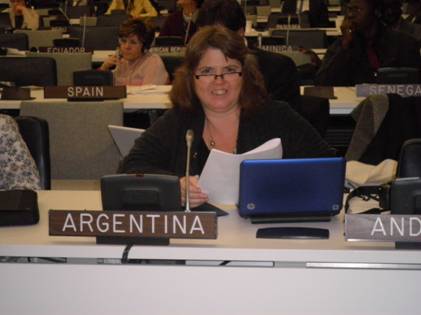|
Speech by Dr. Monica Roqué, National Director for Policy on Aging of the National Secretariat for Children, Youth and Family of the Ministry of Social Development of
Argentina
Commission
for Social Development
February 3 to 5, 2010

Mr Chairman,
I am honored to take the floor on behalf of the members and associated States of MERCOSUR, the Plurinational State of Bolivia, Brazil, Colombia, Chile, Ecuador, Paraguay, Peru, Uruguay and the Boliviarian Republic of Venezuela and my own country, Argentina, to focus on a specific point of the agenda we will be dealing with today.
Population ageing is a phenomenon without precedent, which will increase over time. During the 20th Century, the ratio of older persons has increased and it is expected for this trend to be maintained in the 21st Century. In 2007, 10.7% of the world population was sixty years old or older. In 2025, the projected ratio of older persons is expected to reach 15.1%. And, in 2050, 21.7%.
Every country in the World has experienced changes in the age distribution within the population. Although the regional differences regarding the magnitude of the process varies widely, given each country is in a different stage of the demographic transition. In 2007, in Latin America and the Caribbean, 9.1% of the population was 60 or over. Our region is ageing gradually but inexorably. In absolute terms, between 2000 and 2025, 57 million persons over 60 years of age would be added to the 41 million of today, and between 2025 and 2050, the rise will be by 86 million. Following this dynamic, the ratio of persons over 60 years of age in the total population will quadruple between 2000 and 2050.
Mr. Chairman,
In the developing world, as well as in the high-income countries, millions of elder persons are denied their Rights. They experience isolation, poverty, discrimination, violence and abuse, and have a limited access to Social and Health Services, to information and to legal protection.
There is no legally binding instrument to standardize and protect the rights of older persons. Persuaded that we need to put and end to this situation, the Heads of State of MERCOSUR, in the recent XXXVI meeting of the Common Market Council, committed themselves, within the framework of the United Nations, to call for an International Convention on the rights of older persons, with the goal to provide them with a legally binding instrument to standardize their rights, and to establish mechanisms and organs to ensure them, since this is a vulnerable sector of the population who are subjected to discriminatory practices and treatment.
Mr. Chairman,
The Report presented by the Secretary General on the follow-up of the Madrid Plan of Action offers us an excellent picture of a highly representative sample of State members of the UN, who in an overwhelming majority have offered a positive and constructive view to continue strengthening the promotion and protection of the wellbeing and human rights of older persons, by exploring new paths and new mechanisms to guarantee their dignity and rights.
The Second Regional Conference on Ageing in Latin America and the Caribbean launched in 2007 a Regional Strategy for the implementation of the Madrid Plan of Action with the Brasilia Declaration, which initiated, among other measures, a consultation process towards the preparation of a convention on the human rights of older persons. This process has continued with decisive Follow-up Meetings that took place in September 2008, in Rio de Janeiro, in May 2009 in Buenos Aires and, more recently, in October last in Santiago de Chile. This last meeting was attended by over 250 persons from several regions, representing both governments, organizations of older persons, international organizations and specialized agencies. It is clear how dynamic the process is in the region in the search for new mechanisms that guarantee the human rights of older adults.
We invite the State members of the United Nations that have not yet expressed their position on this issue to strengthen their internal processes of participative dialogue, analysis and reflection, in order to move forward in this framework towards an International Convention on the rights of older persons that must offer this valuable sector of our society the urgent and effective answers they deserve.
Thank you.
|



